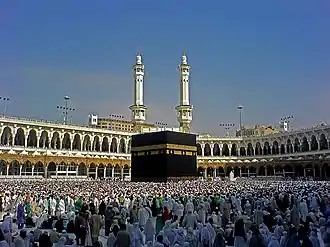Rain prayer
The Rain prayer (Arabic: صلاة الاستسقاء; ṣalāt al-istisqa, "rain request prayer") is a sunnah salah (Islamic prayer) for requesting and seeking rain water from God (Allah) Almighty.[1]
| Rain prayer | |
|---|---|
| Official name | صلاة الاستسقاء |
| Also called | Drought prayer |
| Observed by | Muslims |
| Type | Islamic |
| Significance | A Muslim prayer offered to God seeking rain water. |
| Observances | Sunnah prayers |
| Begins | Duha |
| Ends | Zenith - Noon |
| Frequency | Occasionally |
| Related to | Salah, Nafl prayer, Five Pillars of Islam |
| Part of a series on |
| Islam |
|---|
 |
|
Presentation
Muslim prophetic tradition has reported that on a certain exceptional occasion, while there had been a prolonged drought, a man came to the Holy Prophet Muhammad as he was delivering the Khutba (sermon) of the Friday prayer in the Al-Masjid an-Nabawi mosque, to pray and implore for the rain to fall, for the men and the cattle and the orchards suffered from the lack of water, and in response, the Holy Prophet raised his hands for the Dua and prayed to God to make it rain a downpour.[2]
Likewise, when his supplication was answered and the torrential rain lasted for whole days, the Prophet Muhammad again prayed to God and implored him for the precipitation to cease because there was an excess of rain which then caused caused damage.[3]
On another reported occasion, the Prophet walked out of the mosque in broad daylight into an esplanade with the congregation of priors, and allegedly prayed for the rain to fall, then performed a prayer consisting of two rak'ahs as a group while reading Al-Fatiha aloud, as he does in Friday prayer.[4]
Ritual
In Muslim agricultural societies, in times of calamity such as drought, the Imam is asked to provide spiritual help to the community in the hope of inducing God to fall rain.[5]
Indeed, the farmers regard the rain as a great divine blessing, and every time it rains showers, people rejoice and thank God Almighty.[6]
These Muslim farmers have their livelihoods depending mainly on agriculture, and if it does not rain on time, it means that there will be insufficient harvest, and this causes a lot of worry and anxiety.[7]
Practice
On the day fixed to perform this prayer, the Imam of the mosque mobilizes the faithful to perform this ritual with him collectively to implore Allah to give them enough rain for the agricultural season and for human drinking needs, and personal hygiene.[8]
This prayer ritual takes place in the same open space outside the mosque where the two Eid prayers are held annually according to similar principles.[9]
References
- https://books.google.dz/books?id=MQscDgAAQBAJ&pg=PT0#v=onepage&q&f=false
- https://books.google.dz/books?id=etnEKz_rOfgC&pg=PT311#v=onepage&q&f=false
- https://books.google.dz/books?id=pVk1DwAAQBAJ&pg=PA292#v=onepage&q&f=false
- https://books.google.dz/books?id=udUR_uKyE1kC&pg=PA261#v=onepage&q&f=false
- https://books.google.dz/books?id=CDpzAgAAQBAJ&pg=PT56#v=onepage&q&f=false
- https://books.google.dz/books?id=TXMCDgAAQBAJ&pg=PA434#v=onepage&q&f=false
- https://books.google.dz/books?id=c2qpzDPtaiMC&pg=PA41#v=onepage&q&f=false
- https://books.google.dz/books?id=ofTPUY61X-IC&pg=PP92#v=onepage&q&f=false
- https://books.google.dz/books?id=dVjnaKYAN9sC&pg=PA87#v=onepage&q&f=false
.jpg.webp)

